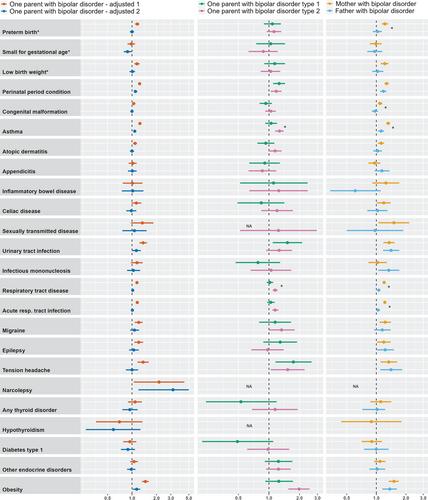Offspring of parents with bipolar disorder have increased risks of their own psychopathology. However, a large-scale survey of psychiatric, somatic, and adverse social outcomes up to adulthood, which could aid in prioritizing and tailoring prevention, is lacking. It also remains to clarify how risks are modified by other parental factors.
Swedish population registers were linked to compare offspring having (N = 24,788) and not having (N = 247,880) a parent with bipolar disorder with respect to psychiatric diagnoses and psychotropic medication, birth-related and somatic conditions, social outcomes, accidents, suicide attempts, and mortality. Individuals were followed until age 18. We estimated the influence of lifetime parental psychiatric comorbidity, bipolar disorder subtype, and sex on outcomes.
Children of parents with bipolar disorder had 2–3 times higher risks of all psychiatric diagnoses, except for bipolar disorder, for which the risk was 11-fold. Significantly increased risks were also found for several somatic conditions, low school grades, criminal behavior, victimization, accidents, and suicidal behavior. Adjusting for lifetime parental psychiatric comorbidity attenuated most associations. Offspring of a parent with bipolar disorder type 2 had statistically significantly higher risks of attention deficit hyperactivity disorder, respiratory tract conditions, and accidents compared with offspring of a parent with bipolar disorder type 1. Offspring of mothers with bipolar disorder had higher risks of several psychiatric diagnoses, respiratory tract conditions, low school grades, and accidents compared with offspring of fathers with bipolar disorder. Having two parents with bipolar disorder entailed the highest risks of psychiatric outcomes in offspring.
Early intervention and family support are particularly warranted for the offspring of a parent with bipolar disorder in the presence of lifetime parental psychiatric comorbidity, when the parent has bipolar disorder type 2, or when the mother or both parents have bipolar disorder.



